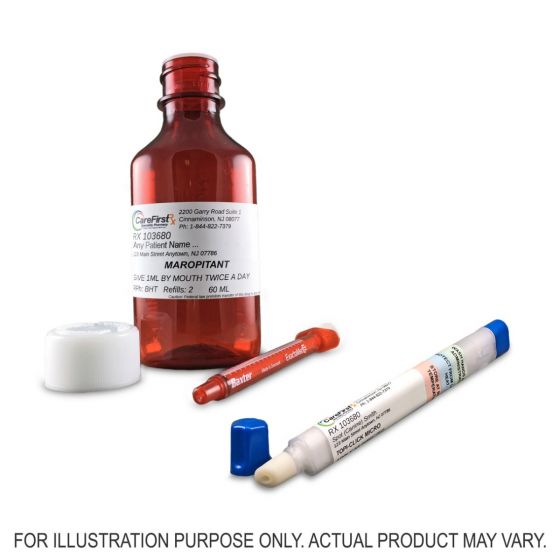Maropitant Compounded
Maropitant is a neurokinin-1 (NK1) receptor antagonist. It is used for the treatment of motion sickness and vomiting in pets. Here at CareFirst Specialty Pharmacy, we can compound maropitant into different formulations such as capsules, oral oil suspension, transdermal creams, and numerous other forms for use.
This medication requires a prescription.
To process your order we will require a prescription from you or your Prescriber. We will only compound and dispense upon receipt of a valid patient specific prescription. Please note that our compounds are exclusively provided for individual patient and are not for office use.
- Your prescriber can mail or fax in the prescription
- You can mail in the original prescription
- We can contact your prescriber for you
- You can transfer your prescription from another pharmacy
Are you a licensed Prescriber?
- We have convenient ways to get your prescription to us:
- Fax to (800) 786-1405 or (844) 922-7379
- Send electronically (e-prescribe) by:
- Searching for CareFirst Specialty Pharmacy in Mount Laurel, NJ 08054
- Using our NCPDP# 3151266
- Phone into (844) 822-7379
- For more information about our products and services:
- Please complete the prescriber form online
- Email us at [email protected]
Looking for a Different Strength?
Contact us for a Quote.
We are a nationally accredited PCAB compounding pharmacy and a .Pharmacy verified website. A verified .Pharmacy website designation ensures our patients and prescribing partners that our website is verified and safe.
Actual product image may vary.
Maropitant
By: Karan Modi
PharmD Candidate 2022
CareFirst Specialty Pharmacy
Maropitant is a neurokinin-1 (NK-1) receptor antagonist for the treatment of motion sickness and vomiting in dogs (approved in 2007) and in cats (approved in 2012). Maropitant has mild pain-relieving, anti-anxiety, and anti-inflammatory effects.
Pronunciation
(ma-rahp-it-ent)
Other Names
Cerenia®
Drug Class
Neurokinin (NK-1) Receptor Antagonist, Antiemetic
Mechanism of Action
Maropitant is a neurokinin-1 (NK-1) receptor antagonist that acts in the CNS by inhibiting the binding of substance P, which is the key neurotransmitter involved in vomiting. Maropitant can suppress both peripheral and centrally mediated emesis. Maropitant has been shown to reduce the minimum alveolar concentration (MAC) requirements of sevoflurane and to reduce visceral pain in dogs, as NK-1 receptors are stimulated by substance P.
Drug Interactions
Drug interactions with maropitant have not been thoroughly investigated. Maropitant may be susceptible to interactions because it is biotransformed in the liver by CYP3A12 and CYP2D15 in dogs and by CYP1A- and CYP3A-related enzymes in cats and is highly bound to plasma proteins. The following drug interactions are theoretical in animals receiving maropitant and may be of significance in veterinary patients. Unless otherwise noted, use together is not necessarily contraindicated, but the potential risks must be weighed and additional monitoring performed when appropriate.
- CALCIUM CHANNEL BLOCKERS (eg, amlodipine, diltiazem, verapamil): The UK label states maropitant should not be used concomitantly with Ca-channel antagonists as maropitant has affinity to Ca-channels.
- CYP3A INHIBITORS (eg, amiodarone, diltiazem, cimetidine, erythromycin, ketoconazole, itraconazole): May reduce maropitant metabolism
- CYP2D INHIBITORS (eg, cimetidine, fluoxetine, terbinafine): May reduce maropitant metabolism
- HIGHLY PROTEIN BOUND DRUGS (eg, phenytoin, valproic acid, oral anticoagulants [rivaroxaban, warfarin], NSAIDs, salicylates, sulfonamides, sulfonylurea anti-diabetic agents): Because maropitant is highly bound to plasma proteins (99.5%), it could potentially displace other highly bound drugs; increased serum levels may occur. Although these interactions are typically not a clinical concern, caution is advised when these drugs are used together.
Contraindications
- Safe use has not been evaluated in dogs or cats that have GI obstructions or ingested toxins.
- Maropitant can cause prolongation of the QT interval because of cardiac potassium channel blockade. Safe use of maropitant has not been reported in patients with underlying cardiac disease when administered in combination with cardiac antiarrhythmic drugs or in combination with doxorubicin.
- Caution is advised in patients with hepatic dysfunction, as maropitant is hepatically metabolized; the dose may be reduced by 50% if used in these patients.
- Caution is advised with other highly protein bound medications, although clinical significance has not been determined.
- In humans, topical exposure may elicit allergic skin reactions in some individuals. In the event of accidental skin exposure, skin should be washed with soap and water. In the event of accidental eye exposure, eyes should be flushed with water for 15 minutes and medical attention should be sought.
Adverse Effects
Maropitant is well tolerated in dogs and cats. Allergic reactions are possible but rare and typically resolve with supportive treatment within 48 hours after the drug is discontinued.
- In dogs, pretravel vomiting and hypersalivation are the 2 most common adverse effects. Other adverse effects reported to the FDA include depression and lethargy, anorexia, diarrhea, anaphylaxis/anaphylactoid reactions (including swelling of the head and face), ataxia, and convulsions.
- In cats, adverse effects reported to the FDA include depression and lethargy, anorexia, injection site pain, hypersalivation, dyspnea, ataxia, fever, recumbency, vomiting, panting, convulsion, and muscle tremors.
Administration
Use this drug as ordered by your prescriber.
Dosing
Contact your healthcare provider for specific dosing instructions.
Dogs
Labeled dosages:
| Indication | Dosage Form | Minimum Age for Use | Dosage | Duration of Therapy |
|---|---|---|---|---|
| Prevention and treatment of acute vomiting | Injection | 2 months | 1 mg/kg SC once daily | Up to 5 consecutive days |
| Prevention and treatment of acute vomiting | Injection | 4 months | 1 mg/kg SC or IV (over 1-2 minutes) once daily | Up to 5 consecutive days |
| Prevention of vomiting caused by emetogenic medications or chemotherapeutic agents | Injection | 4 months | 1 mg/kg SC or IV (over 1-2 minutes) once, 45 to 60 minutes prior to emetogenic medications or chemotherapeutic agents | Single injection |
| Prevention of acute vomiting | Tablets | 2 months | 2 mg/kg PO once daily | 5 days for dogs 2 to 7 months of age; until vomiting ceases in dogs older than 7 months |
| Prevention of vomiting due to motion sickness | Tablets | 4 months | 8 mg/kg PO once daily on an empty stomach or with a small amount of food; do not feed full meal prior to travel | Up to 2 consecutive days |
Cats
Treatment of vomiting in cats 4 months and older: (FDA approved; labeled dosage): 1 mg/kg SC or IV (over 1-2 minutes) once daily for up to 5 consecutive days
Pregnancy/Breastfeeding
Safe use of maropitant in dogs or cats used for breeding or in pregnant or lactating female dogs or cats has not been evaluated.
General Information
- When using to prevent motion sickness, administer maropitant 2 hours before traveling with a small amount of food (not a full meal).
- Some dogs may vomit after taking this medication. Giving the drug with a small amount of food can help prevent vomiting.
- Do not wrap these pills tightly in food snacks, as this can prevent the drug from being released into the stomach.
- If giving your animal fractions (ie, half, quarter) of a tablet, wrap the remaining portion of the split tablet tightly in foil and store away from children and other animals.
- Do not give this drug to puppies younger than 8 weeks, as bone marrow problems can occur.
- Side effects are uncommon; contact your veterinarian if your animal experiences drooling, lethargy (ie, lack of energy), drowsiness/sleepiness, lack of appetite, or diarrhea.
- In humans, topical exposure may elicit allergic skin reactions in some individuals. In the event of accidental skin exposure, wash skin with soap and water. In the event of accidental eye exposure, flush the eye with water for 15 minutes and seek medical attention.
References
Maropitant
Consult your veterinarian.
This is a compounded medication specifically made for you based on a prescription from your licensed veterinarian.
Troches and suppositories require refrigeration (ice packs) and will incur an extra charge of $19.95 per order.




